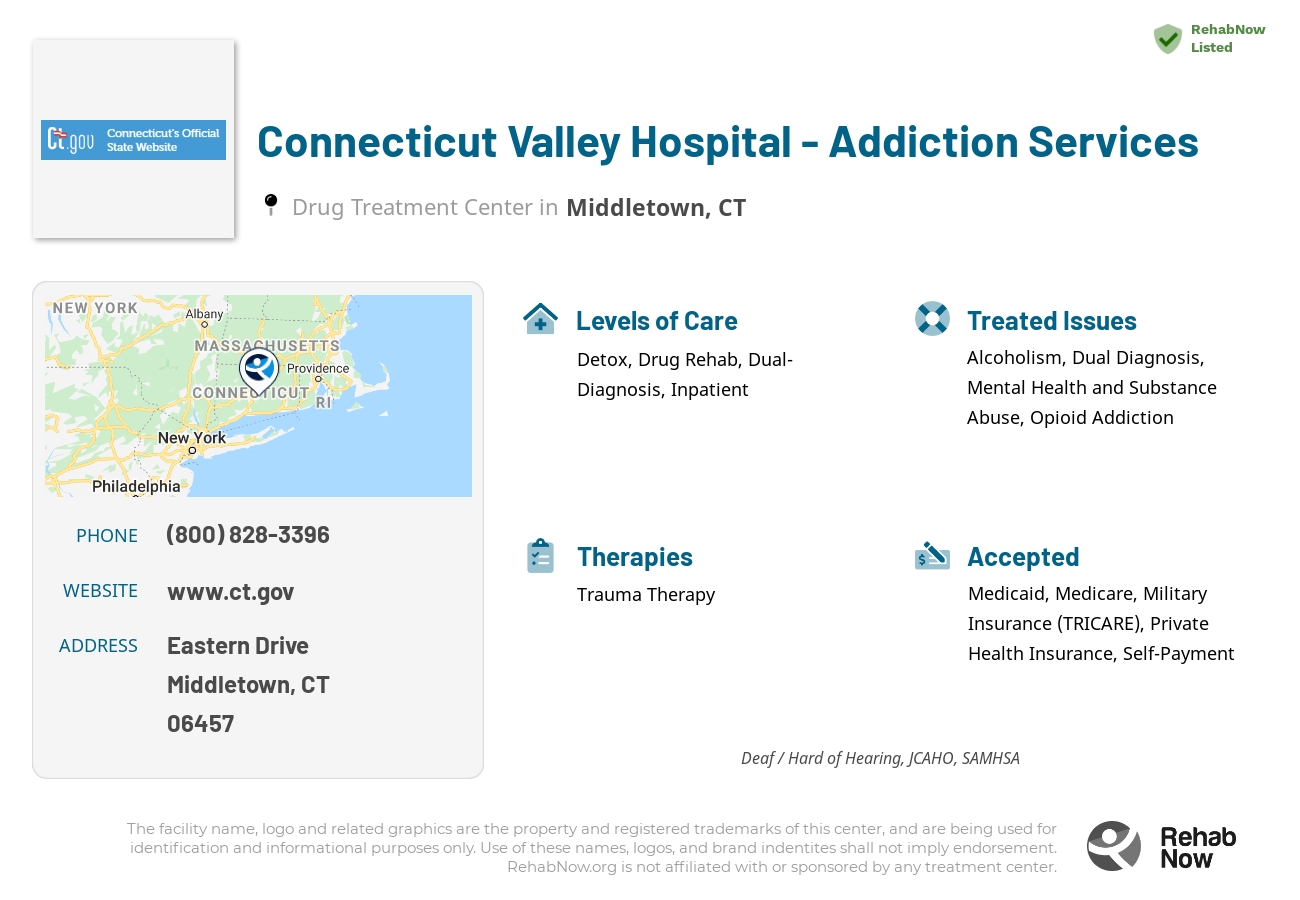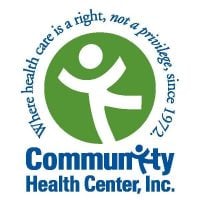Connecticut Valley Hospital - Addiction Services
Drug Rehab Center in Middletown, Connecticut
Connecticut Valley Hospital - Addiction Services provide a wide range of accredited, quality care for those struggling with addiction, from detox and inpatient rehab to accepting most private health insurance plans.
About This Connecticut Facility
Connecticut Valley Hospital - Addiction Services is an Addiction Treatment Facility located in Middletown, Connecticut. This facility is accredited by the Joint Commission on Accreditation of Healthcare Organizations (JCAHO) and has received certification from the Substance Abuse and Mental Health Services Administration (SAMHSA). Connecticut Valley Hospital - Addiction Services specializes in treating individuals suffering from alcoholism, opioid addiction, dual diagnosis, and drug addiction. They offer a range of services including detoxification, inpatient drug rehabilitation, and dual-diagnosis treatment. The facility accepts private health insurance, making their services accessible to a wide range of individuals seeking addiction treatment.
Connecticut Valley Hospital - Addiction Services in Middletown, Connecticut provides comprehensive services to individuals struggling with addiction and substance abuse. Their offerings include detoxification programs, which help individuals safely withdraw from drugs or alcohol under medical supervision. The facility also provides inpatient drug rehabilitation, offering a structured and supportive environment for individuals to work on their recovery. Connecticut Valley Hospital - Addiction Services specializes in dual-diagnosis treatment, allowing individuals to receive treatment for both addiction and co-occurring mental health disorders. With their JCAHO and SAMHSA certifications, this facility ensures high-quality care and a commitment to evidence-based practices.
Genders
Ages
Modality
Additional
Accreditations
SAMHSA

JCAHO
Conditions and Issues Treated
Many people who struggle with opioid addiction need to attend specific programs like methadone , Suboxone or Vivitrol clinics.
These types of programs will provide the patient with legal, prescription medications that can help them overcome their cravings for illegal opioids like heroin or fentanyl . If the patient has a chronic condition like Hepatitis C, they must undergo treatment before they can begin taking these medications.
Dual Diagnosis refers to someone who is both dealing with addiction and another mental health issue.
There are different kinds of Dual Diagnosis: A person who simultaneously experiences both a mental illness and an addiction disorder. Or, a person who experiences one or more coexisting (simultaneous) mental health conditions in addition to a primary substance use disorder.
Some conditions that commonly co-occur with addiction include:
- Personality Disorders (Borderline, Narcissistic)
- Mood Disorders (Bipolar Disorder, Depression, Anxiety Disorder)
- PTSD (Post Traumatic Stress Disorder), OCD (Obsessive Compulsive Disorder), ADHD (Attention Deficit Hyperactivity Disorder)
- Schizophrenia, Psychosis, Hallucinations, Delusions
Levels of Care Offered at Connecticut Valley Hospital - Addiction Services
This center offers a variety of custom treatment tailored to individual recovery. Currently available are Detox, Drug Rehab, Dual-Diagnosis, Inpatient, with additional therapies available as listed below.
An addict may have to go through alcohol or drug withdrawal. While detox may be uncomfortable, it is not life-threatening. Detoxification allows the addict to rid the body of all traces of drugs or alcohol and gives the addict a clean slate for their recovery. In an inpatient or outpatient setting, detox can be managed medically.
Individuals who are suffering from severe addiction or have a high risk for dangerous health concerns are often recommended to receive inpatient treatment.
Choosing to enter an inpatient treatment program is beneficial for people who are suffering from severe addiction, or who have a high risk for dangerous health concerns.
Inpatient treatment is beneficial for:
- People who have a history of severe withdrawal.
- People who have attempted to overcome addiction on their own without success.
- People who have a history of relapse, or have recently relapsed.
- People at risk for drug overdose or withdrawal-related complications.
- People with medical conditions that are worsened by drug or alcohol use.
Therapies & Programs
Trauma Therapy is a form of therapy that involves working with a patient to help them process and understand the past trauma(s) in their life. The idea behind it is that while some people can experience traumatic events and not have lasting psychiatric symptoms, many others will. In these cases, memories of the event get hidden from consciousness but continue to influence how the person processes and copes with things in their life. They may avoid situations that resemble what happened or become suddenly angry or irritated to a situation that reminds them of a past event.
With the help of a therapist, people can go back over memories and experiences. This helps them understand why they are having problems coping with certain situations and how they can change how they think and react to things. This therapy is typically done using techniques such as visualization, discussion, and writing down thoughts and feelings.
Trauma therapists will work with clients to help them understand their past and present relationships. Many times, patients may believe that something is inherently wrong with them or that they are unworthy of love. A therapist aims to correct these negative feelings and behaviors by helping the person realize that their actions do not reflect who they truly are.
One of the main goals of trauma therapy is to help clients express their emotions and talk about what they are feeling. This benefits both to increase awareness of how certain events have impacted them in the past and enables patients to realize that they can make changes in their lives.
Payment Options Accepted
For specific insurance or payment methods please contact us.
Is your insurance accepted?
Ask an expert, call (888) 674-0062
Connecticut’s Official Associated Centers
Discover treatment facilities under the same provider.
- Hartford Dispensary - Manchester in Manchester, CT
- Hartford Dispensary - New London in New London, CT
- West Haven Mental Health Clinic in West Haven, CT
- Hartford Dispensary - Henderson - Johnson in Hartford, CT
- Capitol Region Mental Health Center in Hartford, CT
Learn More About Connecticut’s Official Centers
Additional Details
Specifics, location, and helpful extra information.
Middletown, Connecticut 6457 Phone Number(800) 828-3396 Meta DetailsUpdated November 25, 2023
Staff Verified
Patient Reviews
There are no reviews yet. Be the first one to write one.
Middletown, Connecticut Addiction Information
Connecticut has a higher rate of substance abuse and addiction than the national average. The state ranks in the top 10 in the country for illicit drug dependence among those ages 18 to 25. In 2010, there were 9,211 people admitted to an alcohol treatment facility for alcohol abuse combined with a secondary drug. Connecticut ranked fifth in the United States of America for the number of fatalities involving drunk driving in 2014.
In 2013, there were over 2,000 reported incidents of drug abuse in Middletown, Connecticut. Drug overdose was the direct cause of death for over 800 people in 2014. 837 people abuse alcohol in Middletown, Connecticut. The cost of addiction is also taking a toll on the community as it costs the city millions of dollars. One great way to find the best treatment for anyone is to do some online research.
Treatment in Nearby Cities
- Schenectady, CT (110.0 mi.)
- Torrington, CT (30.5 mi.)
- Bethel, CT (42.4 mi.)
- Plainfield, CT (38.1 mi.)
- Enfield, CT (31.4 mi.)
Centers near Connecticut Valley Hospital - Addiction Services
The facility name, logo and brand are the property and registered trademarks of Connecticut Valley Hospital - Addiction Services, and are being used for identification and informational purposes only. Use of these names, logos and brands shall not imply endorsement. RehabNow.org is not affiliated with or sponsored by Connecticut Valley Hospital - Addiction Services.













